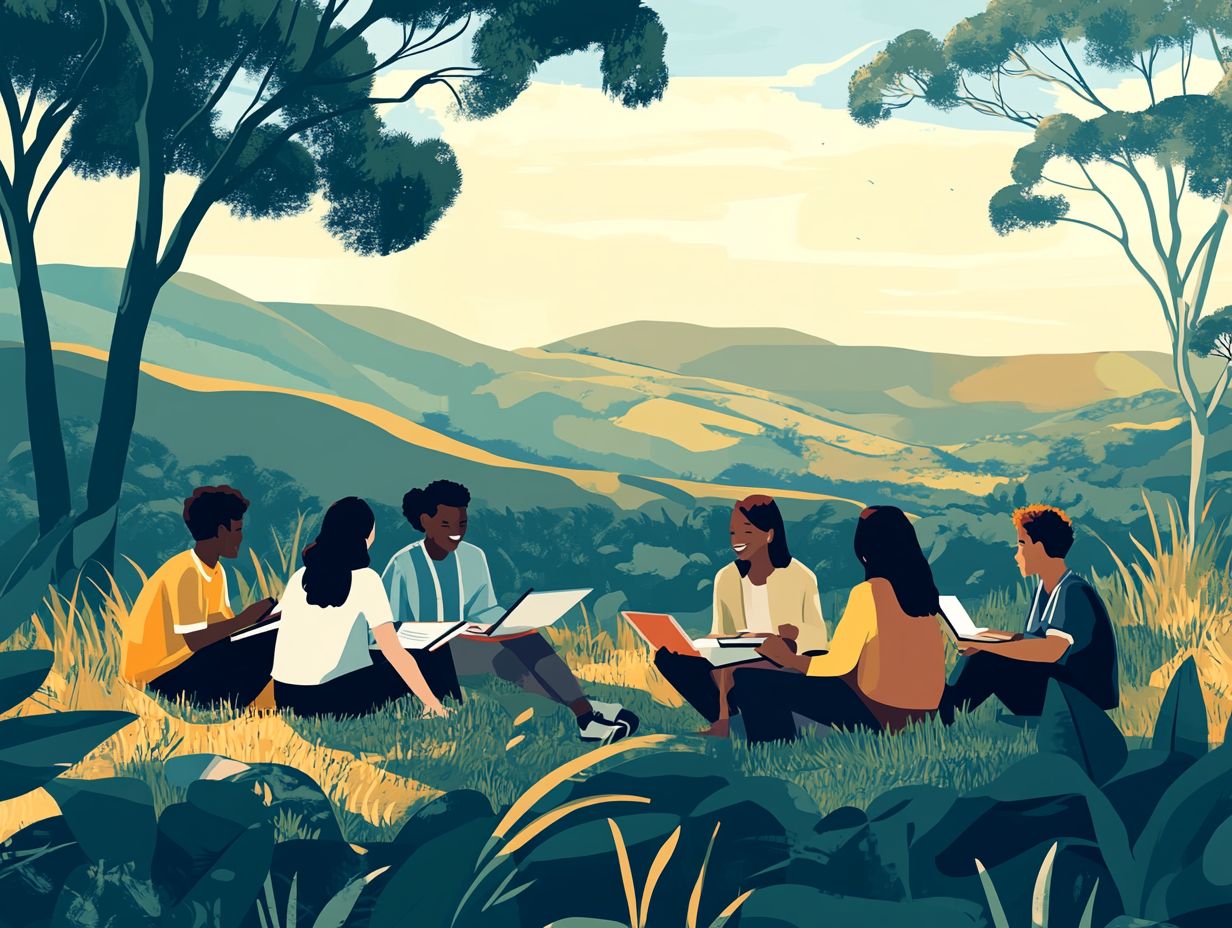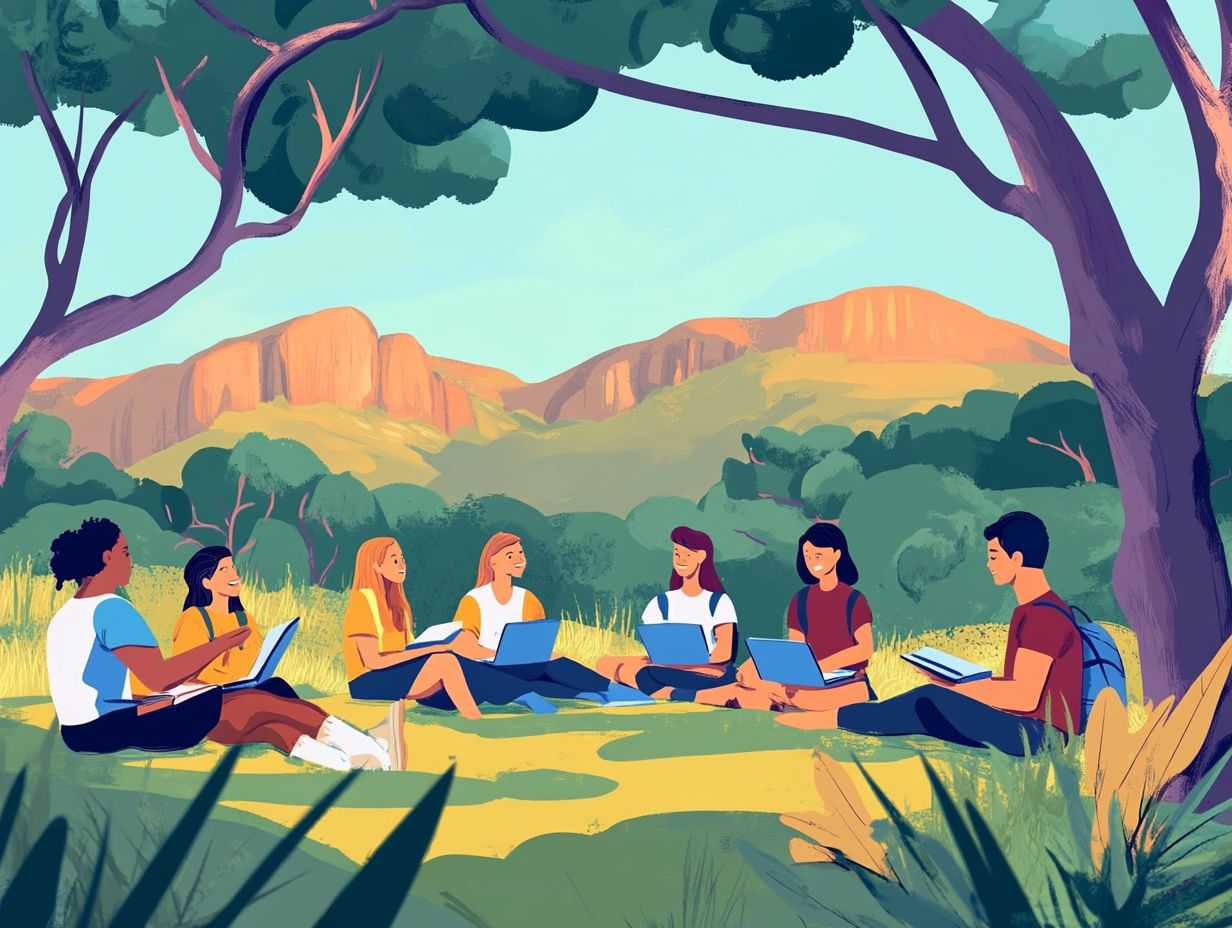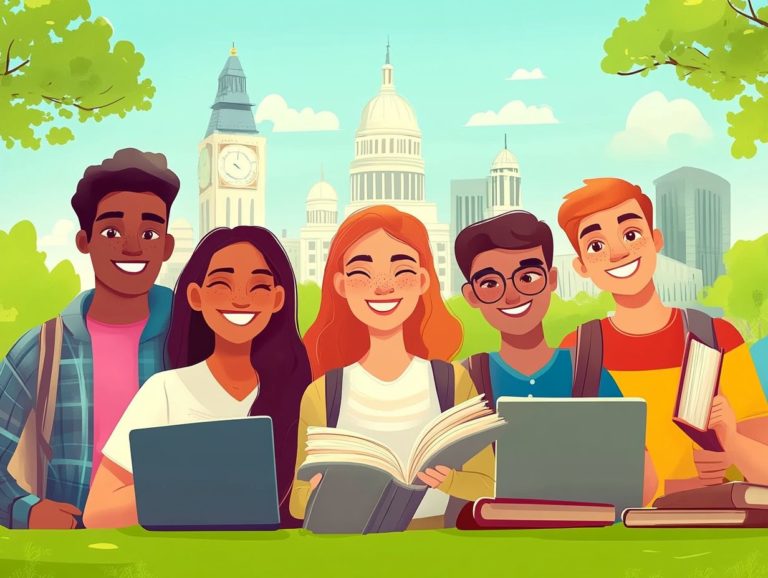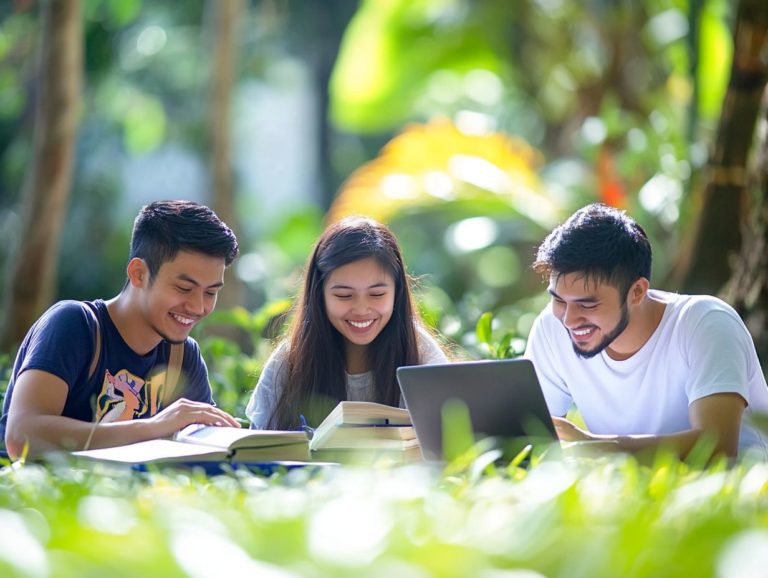5 Essential Skills for Students in Australia
In today s fast-paced world, you must equip yourself with essential skills for success in both academic and professional arenas. This article delves into five important skills time management, communication, critical thinking, adaptability, and cultural awareness that can profoundly influence your journey as a student.
It examines how these skills can benefit you, outlines strategies for their development, and provides insights on handling difficulties along the way.
It also highlights the top industries in Australia that prioritize these competencies and offers expert tips for showcasing them on your resume and during interviews. Get ready to empower your future!
Contents
- Key Takeaways:
- 1. Time Management
- 2. Communication Skills
- 3. Critical Thinking
- 4. Adaptability
- 5. Cultural Awareness
- How Can These Skills Benefit Students in Their Academic and Professional Lives?
- What Are Some Ways to Develop These Skills?
- How Can Students Overcome Challenges in Developing These Skills?
- What Are the Top Industries in Australia That Require These Skills?
- What Are the Differences in Developing These Skills in a Multicultural Environment?
- How Can Students Showcase These Skills in Their Resumes and Job Interviews?
- Frequently Asked Questions
- What are the 5 essential skills for students in Australia?
- How can students improve their critical thinking skills?
- Why is communication important for students in Australia?
- What strategies can students use to manage their time effectively?
- How can students develop adaptability?
- Why is teamwork a crucial skill for students in Australia?
Key Takeaways:

- Effective time management leads to better academic performance and work-life balance.
- Strong communication skills pave the way to building relationships and succeeding in diverse workplaces.
- Developing critical thinking enables students to analyze and solve complex problems in their studies and future careers.
1. Time Management
Time management is an essential skill for you as an international student studying in Australia. It enables you to effectively balance academic responsibilities, part-time jobs, and personal commitments while carefully managing your budget and finances.
By employing techniques such as prioritizing tasks based on deadlines and importance, you can allocate your time more wisely. Utilizing planners or digital tools (like apps or software that help you plan your time) helps you keep track of deadlines and commitments, ensuring you remain organized and on top of your workload.
Setting realistic goals allows for a more manageable approach to tasks, reducing stress and enhancing your productivity. Mastering these skills can significantly improve your academic performance, leading to better grades and a more satisfying educational experience.
A good schedule helps you balance work and relaxation, providing you with more opportunities for relaxation and social activities an invaluable aspect while navigating life in a foreign environment.
2. Communication Skills
Strong communication skills are essential for you as an international student in Australia. Effective interaction not only enhances your academic success but also facilitates social integration and opens up professional opportunities, especially when tackling language tests needed to study in Australia.
These skills encompass a variety of communication forms, from verbal exchanges in classrooms to the non-verbal cues that play a significant role in social interactions, as well as the increasingly important digital correspondence found in online learning and networking.
For instance, being able to articulate your thoughts clearly during group discussions can greatly improve understanding and collaboration with your peers. Similarly, noticing how body language affects communication during presentations or casual meetups can foster deeper connections.
In workplace environments, mastering digital communication tools is crucial for efficient project management and collaboration, making it vital for you to excel in internships or job placements.
3. Critical Thinking
Critical thinking is an essential skill for you as an international student studying in Australia. It enables you to analyze information, solve problems collaboratively, and adapt to diverse learning environments using both creative and analytical approaches.
This vital skill includes several key components, such as analysis, evaluation, and inference. You can sharpen your analytical abilities by thoroughly examining data and literature, enabling you to dissect various viewpoints effectively. For instance, during group projects, evaluating the credibility of sources will enrich your discussions and lead to more informed conclusions.
Inference becomes crucial as you draw conclusions based on the information gathered a particularly important aspect when navigating multicultural settings, where differing perspectives can spark innovative solutions.
In a seminar discussion, your ability to synthesize these skills not only enhances problem-solving but also fosters teamwork. This ensures that each participant’s unique background is recognized as a strength rather than a barrier, creating an enriched learning experience for everyone involved.
4. Adaptability

Adaptability is essential for you as an international student in Australia. It enables you to navigate the complexities of a new educational system.
You can embrace cultural differences and thrive in dynamic environments. This is crucial for collaborating with diverse peers during teamwork and problem-solving.
This quality not only enhances your academic experiences but also helps you build meaningful relationships and cultural exchanges. Learning to be flexible in unfamiliar situations significantly contributes to your personal growth and resilience.
Jump into group projects for amazing opportunities in team-building and cooperation! Participating in workshops will help you develop essential skills for various situations.
Embracing new experiences whether exploring local traditions or sampling different cuisines invites an open-minded approach that deepens your understanding of the world and enriches your educational journey.
5. Cultural Awareness
Cultural awareness is an essential skill for you as an international student studying in Australia. It opens the door to understanding and respecting diverse backgrounds, enriching your communication skills and enhancing your teamwork and problem-solving abilities in multicultural settings.
By embracing the nuances of different cultural perspectives, you’ll find yourself navigating academic challenges and social interactions with greater ease. This awareness helps you recognize and value differences while fostering inclusivity, creating an environment where everyone s voice matters.
Consider collaborative projects, for example. When you acknowledge varying communication styles and working habits, you can sidestep potential conflicts and nurture a sense of belonging. As you become more adept at appreciating diverse viewpoints, you’ll enhance your ability to collaborate seamlessly, ultimately paving the way for innovative solutions and a more harmonious academic community.
How Can These Skills Benefit Students in Their Academic and Professional Lives?
The skills you acquire while studying in Australia such as effective communication, time management, adaptability, and critical thinking greatly enhance your academic performance and prepare you for a successful professional career in a competitive job market.
These competencies do more than just deepen your understanding of course materials; they also enable you to navigate complex workplace dynamics with ease. For instance, industries like healthcare and technology in Australia place a premium on effective communication, as professionals must collaborate closely with diverse teams. Similarly, sectors such as engineering and finance highly value critical thinking and adaptability, essential for tackling problems and driving innovation.
As you refine these skills, you not only boost your grades but also establish a strong foundation for long-term career advancement. This makes you an exceptionally attractive candidate to potential employers when it’s time to transition into the workforce.
What Are Some Ways to Develop These Skills?
Developing essential skills as an international student in Australia is entirely achievable through various methods. You can attend workshops, engage in training programs, and explore must-do activities for students in Sydney, while also leveraging digital literacy—the ability to use technology effectively—to enhance your creative and critical thinking abilities.
Take, for example, the University of Sydney. It offers a range of professional development workshops that focus on research skills and intercultural communication, allowing you to refine your capabilities in a rich multicultural setting. Similarly, vocational education providers like TAFE NSW run targeted training programs designed to elevate your skills in areas such as hospitality and business management.
Don t overlook extracurricular activities; joining student associations or volunteering can significantly enhance your teamwork and networking opportunities. Collaborating with peers on group projects fosters effective communication and helps you build confidence.
Online platforms like Coursera and LinkedIn Learning grant you access to a treasure trove of courses, enabling you to expand your knowledge and competencies well beyond traditional classroom learning.
How Can Students Overcome Challenges in Developing These Skills?

International students encounter various challenges while honing essential skills such as teamwork, problem-solving, and cultural awareness. However, with the right strategies, you can conquer these challenges and thrive both academically and socially in Australia.
To tackle issues like language barriers and cultural differences, seeking support from peers and mentors is invaluable. Many educational institutions offer language assistance programs and cultural workshops specifically designed to help you adjust more smoothly.
Engaging in student organizations or study groups not only fosters inclusivity but also opens doors for collaboration, allowing you to practice your communication skills in a supportive environment.
Tapping into online resources and academic support services provides further guidance, ultimately enabling you to confront challenges head-on while enhancing your overall learning experience.
What Are the Top Industries in Australia That Require These Skills?
In Australia, various industries highly value the skills you develop as an international student, such as technology proficiency, communication abilities, and adaptability. These skills make you exceptionally sought after in sectors like hospitality, education, healthcare, and information technology.
Take the hospitality sector, for instance. Here, adaptability is key, especially as businesses strive to enhance customer experiences in an increasingly competitive landscape. Expect job openings in this field to grow by 12% by 2026!
Meanwhile, in the education sector, there’s a rising reliance on technology skills, with a notable 20% increase in demand for educators who are well-versed in digital tools.
In healthcare, as the industry grapples with significant staffing challenges, the need for communicative professionals is paramount. The Australian Government predicts a shortage of over 100,000 workers in this field by 2025.
Lastly, the information technology sector is thriving, with a robust 30% increase in job openings driven by the rapid digital transformation sweeping across industries.
What Are the Differences in Developing These Skills in a Multicultural Environment?
Developing your skills in a multicultural environment, like the one you ll find in Australia, presents you with unique opportunities and challenges. You will boost your communication skills and adaptability by immersing yourself in diverse perspectives and approaches.
As you navigate this vibrant tapestry of cultures, you ll engage in rich interactions that can significantly strengthen your ability to collaborate effectively. This environment encourages sharing various ideas and traditions, enriching your personal experience while cultivating essential cultural competence (the ability to understand and interact effectively with diverse cultures).
However, learning in a multicultural context isn t without its challenges. Different communication styles can sometimes cause misunderstandings. Yet, by overcoming these hurdles, you’ll sharpen your problem-solving skills and flexibility, ultimately equipping yourself for success in an increasingly globalized workforce.
How Can Students Showcase These Skills in Their Resumes and Job Interviews?
International students have a golden opportunity to highlight their developed skills think communication, teamwork, problem-solving, and adaptability in their resumes and job interviews. This significantly boosts their employability, or the ability to find and hold a job, in the Australian job market.
To make a lasting impression, it’s crucial to weave in specific examples that showcase these competencies. For instance, when discussing teamwork, you might say, “Successfully collaborated on a multicultural group project, leading to an innovative solution that increased efficiency by 20%.” This kind of detail turns heads.
In your resume, use action verbs such as “coordinated,” “developed,” and “facilitated.” These can truly make your achievements pop. During interviews, prepare real-life scenarios that illustrate your adaptability. For example, discuss how you effectively managed your time while balancing studies and part-time work.
Connecting these experiences to job requirements demonstrates your competence and highlights your personal growth. This approach can wow potential employers!
Frequently Asked Questions

What are the 5 essential skills for students in Australia?
The five essential skills are critical thinking, communication, time management, adaptability, and teamwork.
How can students improve their critical thinking skills?
Students can enhance their critical thinking skills by asking questions, analyzing information, and making connections between different concepts.
Why is communication important for students in Australia?
Communication is vital because it helps students express their ideas, collaborate with others, and build relationships with peers and future colleagues.
What strategies can students use to manage their time effectively?
To manage time effectively, students can create a schedule, set realistic goals, and prioritize tasks.
How can students develop adaptability?
Students can develop adaptability by embracing change, being open to new experiences, and learning from failure.
Why is teamwork a crucial skill for students in Australia?
Teamwork is crucial as it prepares students for the collaborative nature of the workforce, helps them learn from others, and promotes diversity and inclusivity.
Don’t wait! Start highlighting your skills today to catch the eye of employers.






